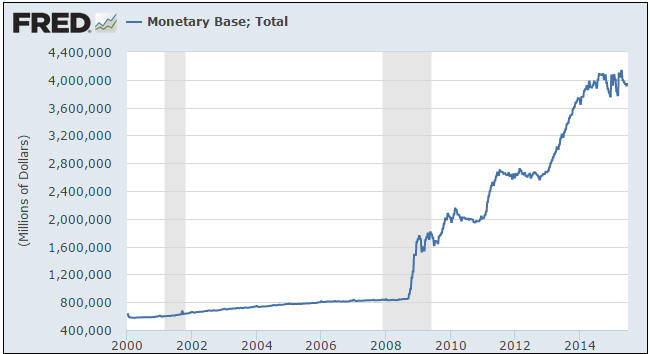A popular view these days is that the euro is a failed experiment because economically and/or politically disparate countries cannot share a currency without eventually bringing on a major crisis. Another way of expressing this conventional wisdom is: a monetary union (a common currency) cannot work without a fiscal union (a common government). This is unadulterated hogwash. Many different countries in completely different parts of the world were able to successfully share the same money for centuries. The money was called gold.
The fact that a bunch of totally disparate countries in Europe have a common currency is not the problem. The problem is the central planning agency known as the European Central Bank (ECB), which tries to impose a common interest rate across these diverse countries/economies. This leads to even more distortions than arise when such agencies operate within a single country (the Fed in the US, for example), which is really saying something considering the distortions caused by the Fed and other single-country central banks.
I’m reticent to pick on John Hussman, because his analysis is usually on the mark. However, his recent comments on the Greek crisis and its supposed relationship to a common currency make for an excellent example of the popular view that I’m taking issue with in this post. Here is the relevant excerpt from the Hussman commentary, with my retorts interspersed in brackets and bold text:
“The prerequisite for a common currency is that countries share a wide range of common economic features. [No, it isn’t! Money isn’t supposed to be a tool that is used to manipulate the economy, it is supposed to be a medium of exchange.] A single currency doesn’t just remove exchange rate flexibility. It also removes the ability to finance deficits through money creation, independent of other countries. [Removing the ability to finance deficits through money creation is a benefit, not a drawback.] Moreover, because capital flows often respond more to short-term interest rate differences (“carry trade” spreads) than to long-term credit conditions, the common currency of the euro has removed a great deal of interest rate variation between countries. [No, the ECB has done that. In the absence of the ECB, interest rates in the euro-zone would have correctly reflected economic reality all along.] It may seem like a good thing that countries like Greece, Spain, Italy, Portugal, and others have been able to borrow at interest rates close to those of Germany for nearly two decades. But that has also enabled them to run far larger and more persistent fiscal deficits than would have been possible if they had individually floating currencies. [This is completely true, but it is the consequence of a common central bank, not a common currency.]
The euro is essentially a monetary arrangement that encourages and enables wide differences in economic fundamentals between countries to be glossed over and kicked down the road through increasing indebtedness of the weaker countries in the union to the stronger members. [The ECB, not the common currency, encourages this.] This produces recurring crises when the debt burdens become so intolerable that even short-run refinancing can’t be achieved without bailouts.
Greece isn’t uniquely to blame. It’s unfortunately just the first country to arrive at that particular finish line. Greece is simply demonstrating that a common currency between economically disparate countries can’t be sustained without continuing subsidies from the more prosperous countries in the system to less prosperous ones. [If this is true, how did economically disparate countries around the world use gold as a common currency for so long without the more prosperous ones having to subsidise the less prosperous ones?]“
Money is supposed to be neutral — a medium of exchange and a yardstick. It is inherently no more problematic for totally disparate countries to use a common currency than it is for totally disparate countries to use common measures of length or weight. On the contrary, there are advantages to the use of a common currency in that trading and investing are made more efficient.
In conclusion, the problem is the central planning of money and interest rates, not the fact that different countries use the same money. It’s a problem that exists everywhere; it’s just that it is presently more obvious in the euro-zone.
 Print This Post
Print This Post


